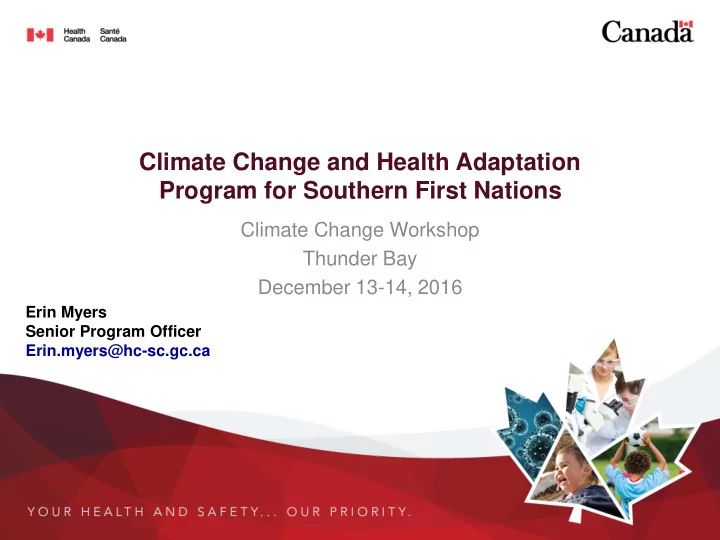

Climate Change and Health Adaptation Program for Southern First Nations Climate Change Workshop Thunder Bay December 13-14, 2016 Erin Myers Senior Program Officer Erin.myers@hc-sc.gc.ca
Outline What is the Climate Change and Health Adaptation Program (CCHAP)? Program Objectives Program Structure History of the CCHAP Results Output Case Studies Impacts of the CCHAP
“ As Indigenous Peoples we have always done research, always searched for understanding, ways of being and knowing the world around us in order to survive, we just didn’t call it research” Former Chief Norman Bone, Keeseekoowenin First Nation.
What is the CCHAP 4
What is the CCHAP Health Canada’s Climate Change and Health Adaptation Program or CCHAP began in 2008 and has supported 95 projects in northern First Nations and Inuit communities in adapting to the health impacts of climate change. The research projects supported by CCHAP in Northern First Nation and Inuit communities represent a significant Canadian contribution to support the global effort by Indigenous communities to adapt to climate change. The exchange of scientific and Traditional Knowledge between community researchers and scientists continues to be a key component of the program.
Program Objectives 6
Program Objectives Strengthen communities’ capacity to integrate scientific and traditional/local knowledge streams and enable communities to take immediate adaptation actions on the foundation of better knowledge Community-based approach to research: Areas of research and vulnerability assessments determined by community Incorporates scientific, traditional and local knowledge Develops tools and methods to adapt to changes Engage their community or region with the results
Program Structure 8
Program Structure Proposals submitted through application process are reviewed for: Clarity and relevance to community Adequacy and validity of methodology Community engagement Capacity building Integration of traditional knowledge Plans for dissemination of results and where appropriate translation of results into action Selection committee, comprised of First Nation and Inuit community members, as well as subject matter experts, reviews and approves proposals
Results 10
Results Supported 95 community-driven adaptation projects since 2008 covering many different themes of interest to northern communities Key themes include: Food security and access to traditional food (country food) Safety while on the land Water monitoring Physical and mental health impacts of climate change
12
13
History of the CCHAP
History of the CCHAP
History of the CCHAP
History of the CCHAP
History of the CCHAP
History of the CCHAP
History of the CCHAP
Output 21
Outputs
Impacts of the CCHAP 23
Impacts of the CCHAP So, what’s next? Lesson learned from the CCHAP Adaptation increasingly requires a multidisciplinary approach Importance of integration of scientific and Traditional Knowledge Community-led research moves quickly to action
CCHAP moves to support First Nation Communities in the South • Indigenous peoples and northerners have a strong desire to engage in clean growth and climate change actions while also undertaking adaptation measures to protect health. Communities have expressed a growing interest in taking a leadership role in action to better understand and address vulnerabilities and risks from climate change impacts, take advantage of economic opportunities arising from clean growth, and reduce emissions. • In southern First Nations’ communities and regions, there is a real and urgent gap in public health surveillance, community driven research and adaptation plans to minimize risks to health. Communities are feeling the effects from numerous climate change impacts, from sea level rise, erosion, drought, extreme heat, floods, extreme and unpredictable weather, and access to traditional foods, to name a few. 25
CCHAP South Health Canada’s new Climate Change and Health Adaptation Program for Southern First Nations’ Communities will provide between $500 to $100,000 annually for community-based research and action oriented projects, to help southern First Nation communities minimize risks and adapt to the impacts of climate change on human health. This program creates an opportunity for First Nations to engage with their communities in monitoring, research, assessment, and discussion in order to develop local adaptation action plans to reduce health risks caused by a changing climate. 26
Who can apply for funding? • All southern First Nation communities are eligible for funding. Southern is defined as being located south of 60N. • Individuals, Band Councils, Tribal Councils and Associations, and governments of self-governing First Nation. • Non-government and voluntary associations and organizations, including non-profit corporations that work on behalf or in partnership with First Nation communities. The community must identify them as partners in the research. 27
What are the mandatory criteria for funding? 1) Requests for funding must be less than $100,000 per proposal for one year of funding. (Please note, the program can only fund projects one year at a time. You must re-apply each year with no guarantee of funding for subsequent years.) Funding is released in April and needs to be spent by March of the following year. 2) Proposal must be community-based or regional based research projects and/ or vulnerability assessments and/or adaptation plans. 3) Project must have a health focus. 4) Project outcomes must be linked to community adaptation plans (e.g., use results to provide recommendations to decision-makers and to develop local adaptation action plans). 5) Project must include the integration of local and/or Traditional Knowledge. 6) Proposal must include all of the proposal elements outlined in section 4: What information is required in a proposal? 7) Proposal must demonstrate how the project will be completed and all funding spent by March 31. 8) Projects must demonstrate how they will report on the implementation and results of their projects. 28
Proposal Review • Like the Northern CCHAP, there will be a First Nation Selection Committee established to review and approve proposals • Committee members are community members who have climate change or health backgrounds, research and/or adaptation experience • There will be two members from each region participating as well as one Elder and one youth • All applicants will receive feedback from the committee 29
30
Questions Deadline for submission: Monday February 13 th , 2017 Erin Myers Senior Program Officer Climate Change and Health Adaptation Program Health Canada Phone: 613-291-3887 Erin.myers@hc-sc.gc.ca
Recommend
More recommend